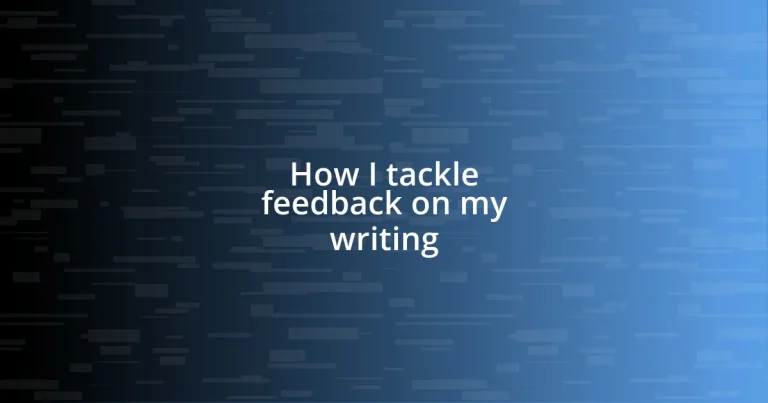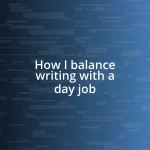Key takeaways:
- Feedback is essential for growth, helping writers uncover blind spots and enhance their skills.
- Approaching feedback with a positive mindset and clear goals transforms it into a valuable learning experience.
- Reviewing progress after incorporating feedback highlights significant improvements and fosters emotional growth in the writing journey.
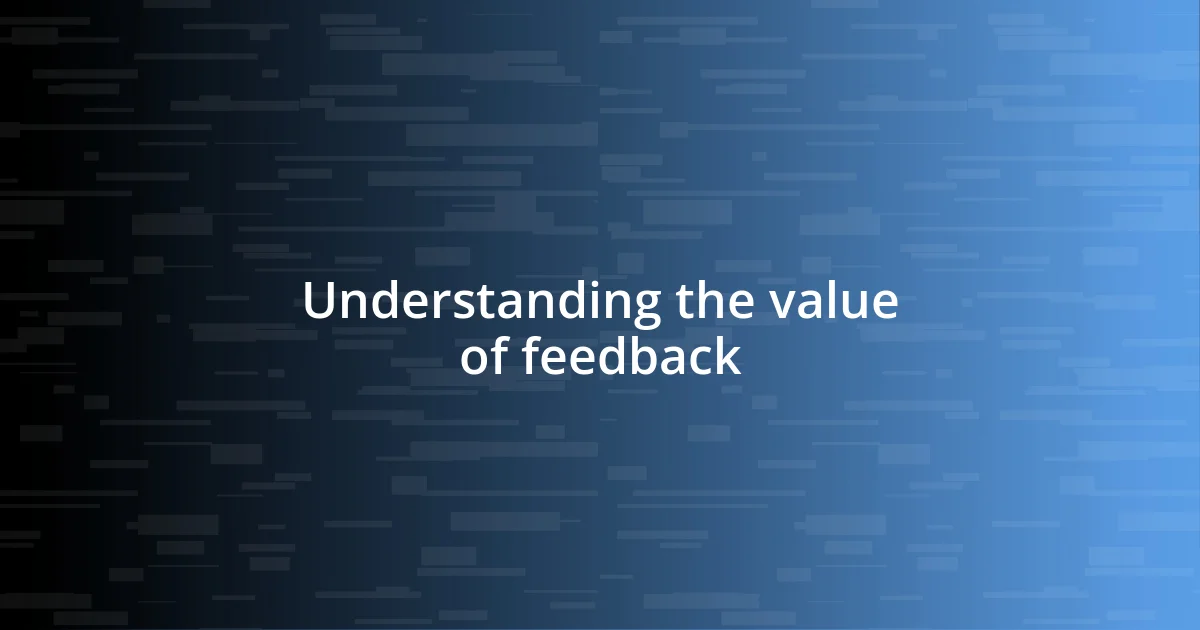
Understanding the value of feedback
Feedback is like a compass guiding me through the often murky waters of writing. I remember a time when a mentor pointed out a repetitive phrase in my work. At first, I felt defensive, but upon reflection, that feedback opened my eyes to the importance of variety in expression. How often do we cling to our comfort zones, unaware of the potential growth just outside our familiar territory?
Receiving feedback can feel daunting, but it’s essential for refining my craft. I’ve found that constructive criticism often reveals blind spots I didn’t even know existed. In one instance, a fellow writer suggested I add more emotional depth to my characters, which transformed my storytelling and connected me more closely to my audience. Can you recall a moment when someone’s input changed your perspective entirely?
Understanding feedback not only enhances my writing but also fosters personal growth. Sharing my work with others makes me vulnerable, yet I’ve learned that this vulnerability leads to deeper connections and richer writing. I often ask myself, “What if I hadn’t taken that chance?” The potential rewards from embracing feedback are immeasurable, paving the way for ongoing improvement and confidence in my writing journey.
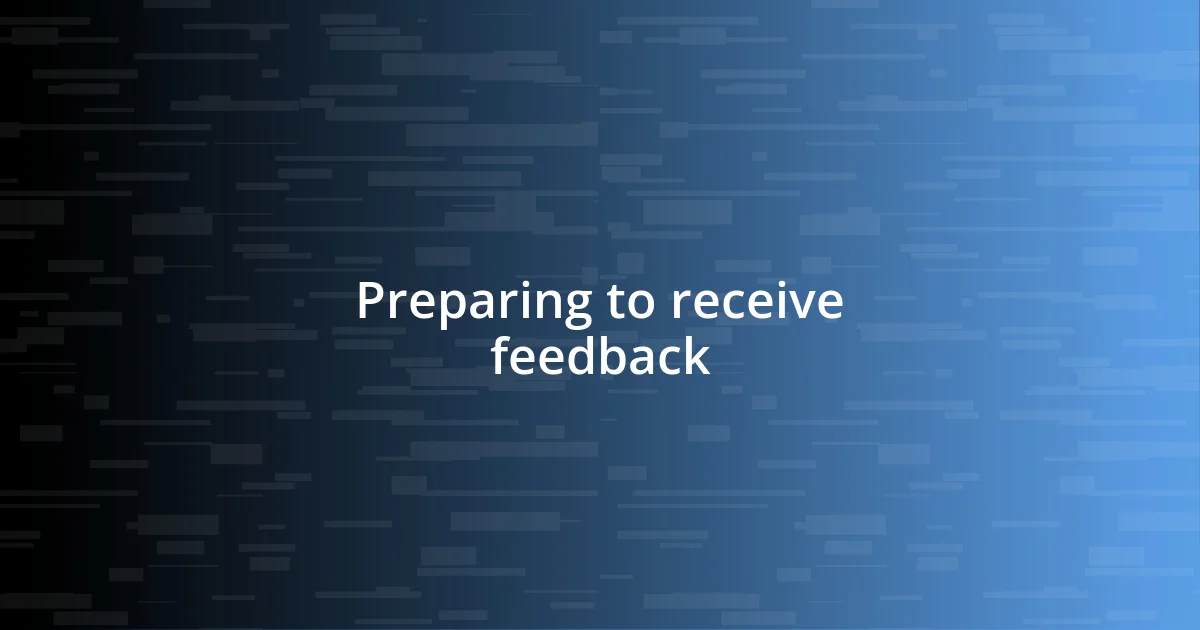
Preparing to receive feedback
Preparing to receive feedback can be a transformational step in my writing journey. I’ve learned that my mindset going into it makes all the difference. I remember the first time I shared a piece I poured my heart into. The anxiety was palpable, as I braced myself for any negative comments. However, I soon realized that viewing feedback as a gift rather than a critique reshaped my experience entirely.
To ensure I’m in the right frame of mind when receiving feedback, I’ve found it helpful to do the following:
- Set clear goals for what I want to improve: Focusing on specific areas of my writing helps me steer the conversation in a beneficial direction.
- Remind myself of my growth: Reflecting on past feedback that led to improvements not only reassures me but also builds my confidence.
- Stay open and listen actively: Acknowledging the contributor’s perspective helps me absorb their insights without feeling defensive.
- Take breaks if needed: If feedback becomes overwhelming, stepping away for a moment allows for deeper reflection.
- Choose my audience wisely: Seeking feedback from individuals who understand my style ensures that their input is relevant and constructive.
Approaching feedback with these strategies not only eases my nerves but also enriches my writing process immensely.

Analyzing feedback objectively
Analyzing feedback objectively requires a nuanced perspective. I often remind myself that feedback is a reflection of how others perceive my work, not a definitive judgment on my abilities. When I received critical feedback on a project I thought was near perfect, my initial reaction was to dismiss it. However, after some consideration, I realized that analyzing the feedback helped me see my work through fresh eyes, uncovering areas for improvement that I hadn’t previously noticed.
When I dive into feedback, I categorize it into constructive insights and subjective opinions. This approach lets me sift through what truly matters for my growth. Once, a reader described my narrative as “confusing,” which felt harsh at first. But when I analyzed their comments, I saw patterns in my writing that could bewilder anyone unfamiliar with the context. Instead of rejecting that view, I took it as a reminder to clarify my narrative structure and improve readers’ understanding.
Balancing emotional responses with analytical thinking can be tricky. I often ask myself, “What can I learn from this feedback?” For instance, a critique on pacing led to a significant revision in my storytelling approach, making my writing more engaging. By framing feedback as a learning opportunity rather than a personal attack, I transform the experience into a growth exercise, building resilience along the way.
| Feedback Type | My Reaction |
|---|---|
| Constructive Criticism | Valuable insights for growth |
| Subjective Opinions | Take with a grain of salt |
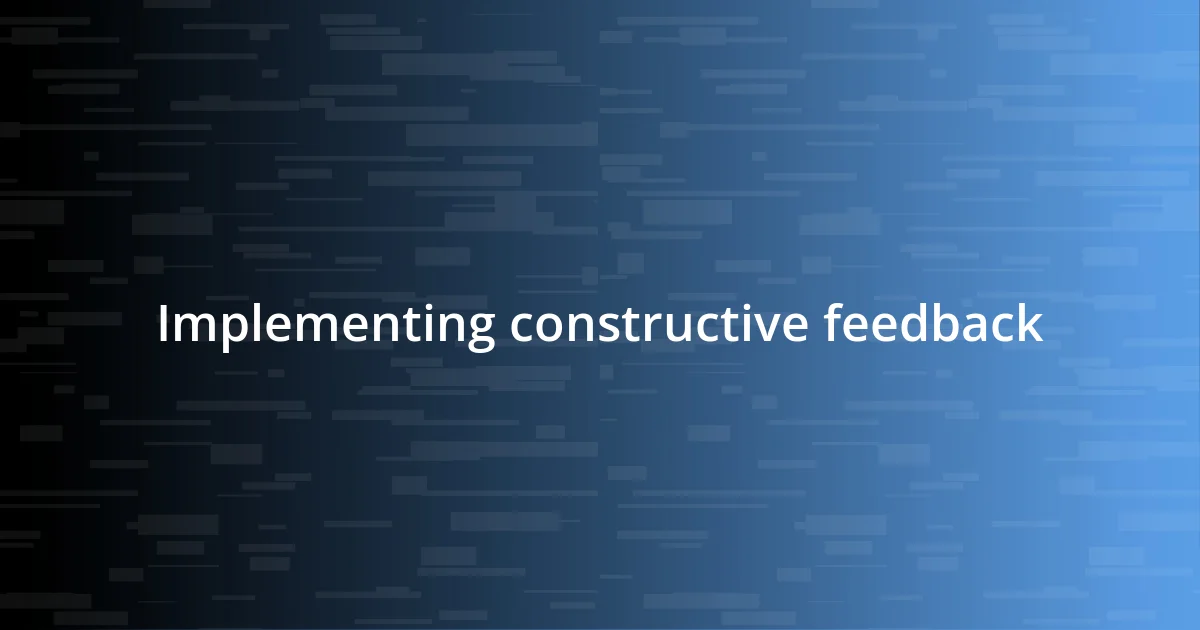
Implementing constructive feedback
Implementing constructive feedback is where the real magic happens in my writing process. After receiving feedback, I make it a point to actively incorporate those suggestions into my revisions. I recall a time when a mentor pointed out that my characters felt flat. Initially, I felt disheartened, but then I took a step back and focused intently on their advice. I dove deeper into my characters’ backgrounds and emotions, which not only made them more relatable but also enriched my storytelling!
I also find it incredibly beneficial to prioritize feedback based on its overall impact. This means asking myself questions like, “Which suggestion aligns most with my writing goals?” For instance, after a thorough critique of a short story I wrote, I learned that pacing issues were frequently mentioned. By adjusting the pacing to build tension gradually, the revisions transformed the narrative into something readers found much more gripping. I couldn’t help but feel a surge of satisfaction as I recognized how implementing feedback could lead to a more polished piece.
In implementing feedback, I also have a strategy to track changes and reflect on them. I create a list of revisions I’ve made in response to constructive comments, which helps me visualize my progress. One time, I kept a journal of my writing journey, detailing how each piece of feedback shaped my work. This reflection process became a source of motivation, showing me just how far I’d come. Have you ever looked back and realized how embracing feedback has pushed your writing to new heights? That feeling of growth is why I’m dedicated to continually refining my work through what others have thoughtfully shared.
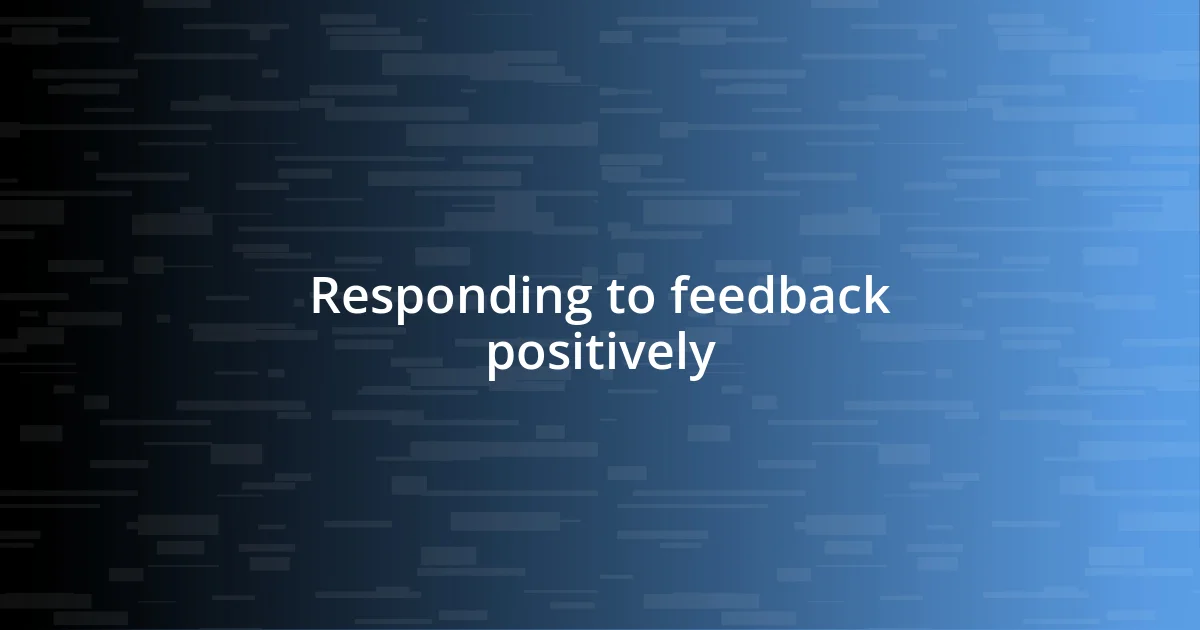
Responding to feedback positively
Responding to feedback positively is crucial for growth, and I’ve learned that my mindset plays a significant role. When I receive feedback that stings a bit, I remind myself that it’s not about me failing, but rather about enhancing my craft. For instance, after sharing an early draft with a trusted colleague, their suggestion to eliminate a beloved scene left me feeling deflated. But, upon reflection, I recognized that their perspective was spot on—it truly distracted from the core message I wanted to convey.
I find it helpful to approach feedback as a conversation rather than a critique. One time, an editor suggested that my tone was too formal for the piece. Instead of taking offense, I engaged with her explanation, diving deeper into why a more conversational tone might resonate better with readers. That engagement led me to rewrite sections in a way that felt more authentic and engaging. Have you ever experienced that moment of clarity when you realize that someone else’s insight can elevate your work in ways you hadn’t thought possible?
Moreover, I always strive to express gratitude for the feedback I receive. By thanking those who take the time to give me their thoughts, I create an environment that encourages open communication. I remember a workshop where a fellow writer gave me tough love about my pacing. Instead of feeling defensive, I thanked him for his honesty, which in turn made it easier for me to absorb his suggestions. This positivity not only enhances my writing process but also fosters stronger relationships within the writing community. Have you ever thought about how a simple “thank you” can shift the dynamic of feedback?
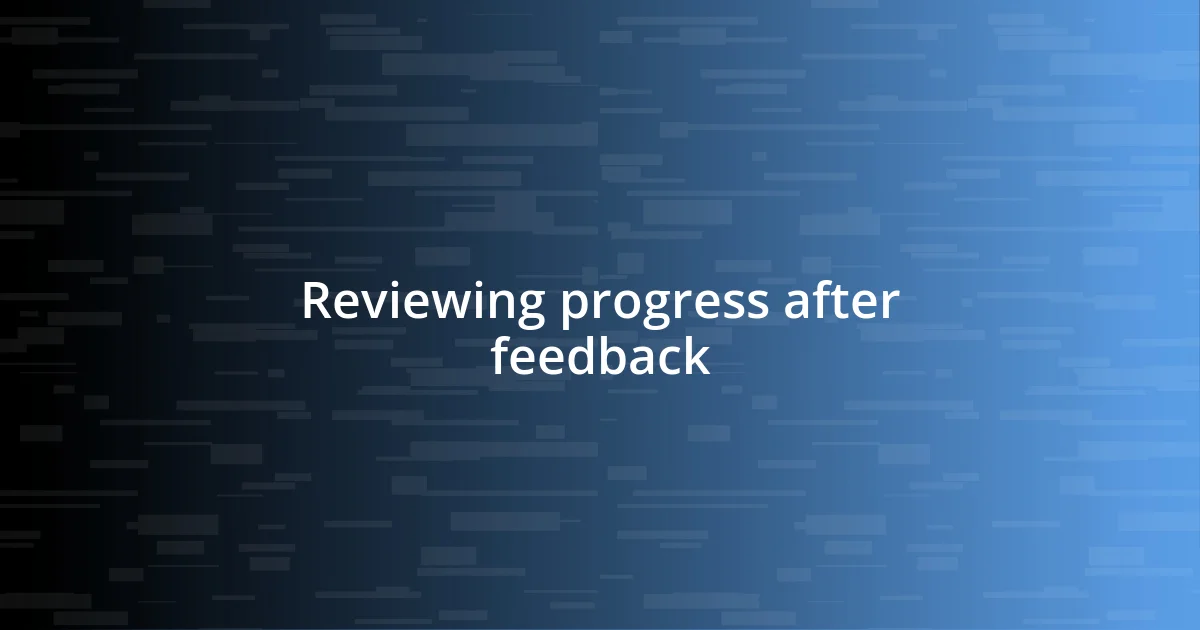
Reviewing progress after feedback
When it comes to reviewing progress after feedback, I find it essential to pause and assess how far I’ve really come. After a round of revisions, I often go back and compare my initial drafts with the final versions. There was a time when I noticed that my writing flowed much better after adjusting the dialogue as per a reviewer’s suggestion. Seeing that difference was a powerful reminder of how impactful feedback can be in my growth.
One of the most rewarding aspects of this process is noting specific improvements that align with my writing goals. I recall receiving feedback about the depth of my themes. After making adjustments and revisiting my work, it was gratifying to see readers connect with layers I hadn’t fully explored before. It made me question—how do we truly measure our growth if not by the resonance of our words with our audience?
I also love to reflect on the emotional journey that comes with these revisions. After my last project, I created a visual representation of my writing process, marking each instance of feedback and how it shaped my narrative arc. Looking back at it evoked a sense of pride. Have you ever crafted something so meaningful that you could almost see the evolution with each piece of advice? This is the heart of growth—recognizing those shifts not just in the work, but within ourselves as writers.












